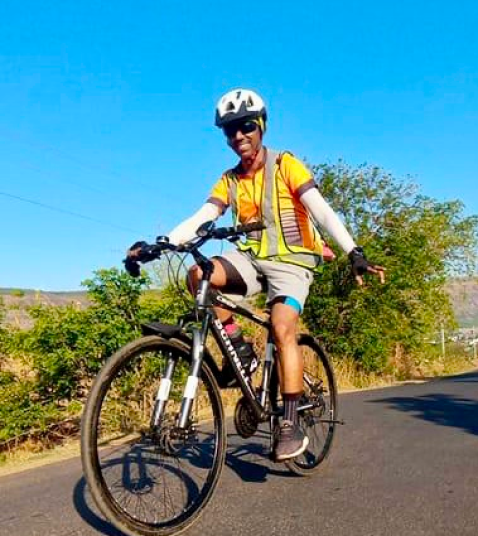Pedals of transformation: Conquering boundaries on a 220 km cycling expedition

Embarking on a long-distance cycling expedition is a profound adventure that pushes physical and mental boundaries. Pedalling for hours, covering vast distances, and conquering challenging terrains, cyclists discover newfound strength, resilience, and determination. This transformative journey unleashes the spirit of adventure within and fosters selfdiscovery for cyclists.
This year, in February, I registered for one such transformative 220 km cycling expedition from Pune to Pandharpur (cycle wari) that took place in the month of June. Although I had completed many sub-50 km cycling trips per day in the past two years, the prospect of covering 220 km in a single day appeared to be a difficult target initially.
I am a part of the PCMC sprinters’ group, comprising runners,cyclists, trekkers and swimmers. Thus, the group assisted me in devising weekly and monthly training targets for a span of four months. They trained me on increasing energy and stamina, practising cycling regularly, and taught me strengthening exercises that needed to be followed every month.
Since it was summer time, exposure to the sun was essential for 8 to 10 hours to get more used to it. The last leg of training made me realise that the task of cycling for a long distance is absolutely doable. In those 4-5 months of training, my mental framework also changed. With a couple of strengthening sessions and training on repairing cycles on the go, I gained confidence about my journey. Along with this, continuous mentoring on WhatsApp benefitted me as most people shared their successes and stories, which helped me gain insights.
To complete my cycling expedition, I practised crosstraining like jogging and walking every day to keep the body moving. Due to following the rules correctly, consuming nutritious food and not stretching ourselves too much, my cycling group and I did not experience any internal injury even after completing 220 km. Thus, focussed training and dedicated practice helped me to achieve my goal.
The distance to be covered per day gradually increased from 50 km to 75 km, then 100 km, and finally 150 km. Engaging in longdistance cycling under scorching 42°C temperatures proved to be an endurance test, with numerous instances that could have discouraged me. Nevertheless, the energy from the 1,500 fellow cyclists propelled me towards my destination in 11 hours,40 minutes on the final day.
I believe that making our hobbies our callings transforms our life immensely. When our hobbies become our calling, our inner drive changes. To achieve this, adhering to a routine purposefully, and maintaining an unbroken momentum, naturally propels us toward our chosen paths.
Thus, it’s essential to keep one or two long-term goals in a year. Keeping a long-term goal induces patience and willingness in you that ultimately helps you in your personal and professional life. Also, when we have a long-term goal in place, we always find a way of achieving it. Moreover, having a long-term goal helps in framing a mindset and makes us believe that one can overcome obstacles in life by planning and preparing for them in a better way.
In today’s fast-paced world, our easy access to things makes us think that everything should happen quickly. With cycling, one gets time to introspect about their actions as cycling captures every passing second in slow motion, fostering profound memories of the surrounding environment.

-C. R. Subramaniam
Group Head, Process Engg., TBWES, Energy House, Chinchwad



